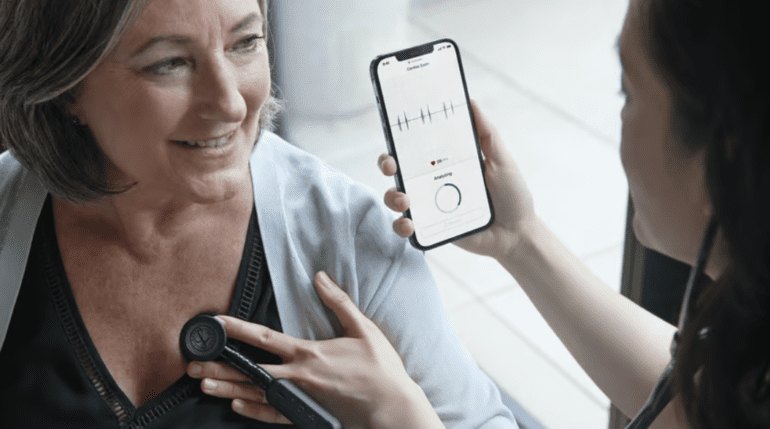TL;DR:
- Eko Health is introducing AI-equipped stethoscopes in UK primary care clinics through a collaboration with Imperial College London.
- The initiative, named TRICORDER, is funded by the UK’s National Institute for Health and Care Research and aims to assist healthcare professionals in identifying heart-related conditions.
- Regulatory approval for Eko’s digital technology platform, Sensora, has been obtained in the UK.
- TRICORDER will begin with 100 general practitioner clinics, directing patients to echocardiograms when needed.
- Potential cost savings of £2,400 per patient and reduced emergency room visits are anticipated.
- Eko’s AI stethoscope combines digital technology and electrocardiogram sensors to detect heart conditions.
- The HFrEF detection program is under FDA review.
- Eko has partnered with Astellas Pharma and Welldoc to develop a heart failure solution.
Main AI News:
Eko Health, in collaboration with Imperial College London, is launching its AI-equipped stethoscopes in primary care practices across the United Kingdom as part of the TRICORDER initiative. This ambitious program, named after the iconic Star Trek handheld health scanner, is funded by the UK’s National Institute for Health and Care Research. Its primary objective is to empower frontline healthcare professionals in identifying cases of heart failure, valve disease, and atrial fibrillation.
Eko’s digital technology platform, known as Sensora in the United States, has recently received regulatory approval in the UK. The TRICORDER program will commence with the deployment of these advanced stethoscopes to 100 general practitioner clinics nationwide. The ultimate goal is to efficiently guide individuals requiring more comprehensive diagnostic evaluations to schedule echocardiograms.
Nicholas Peters, a professor of cardiology at Imperial College London and the NHS Trust, who leads the TRICORDER initiative, emphasized the significance of this endeavor. He stated, “Heart failure admission alone costs the UK over £2 billion annually, and an unacceptable 80% of these diagnoses are made during emergency admissions.”
Furthermore, TRICORDER’s investigators estimate that the implementation of Eko’s cardiac detection technology during routine primary care visits could lead to significant cost savings of £2,400 per patient, approximately equivalent to $3,000 US dollars. Additionally, it can spare patients the need for potential emergency room visits.
Eko’s innovative AI approach combines a digital stethoscope with noise-reduction capabilities and a three-lead electrocardiogram sensor. By analyzing heart sounds and ECG waves, its algorithms are designed to identify structural murmurs indicative of a leaky heart valve and detect reductions in the left ventricle’s pumping performance associated with heart failure.
Eko’s program for detecting heart failure with reduced ejection fraction (HFrEF) is currently undergoing FDA review. The company has highlighted that previous studies have shown the HFrEF algorithm’s sensitivity and specificity to be “approaching 80%.” Sensora made its debut in the US enterprise market in February, following heart murmur clearance in July 2022.
In September, Eko announced a strategic collaboration with Astellas Pharma and Welldoc, aiming to develop an innovative heart failure solution that integrates Eko’s digital stethoscope with Welldoc’s digital therapeutics. Astellas has named this proprietary approach Z1608 and plans to pursue new FDA clearances for remote patient monitoring along with an accompanying smartphone application. This collaborative effort reflects the ongoing commitment to advancing cardiac care through cutting-edge technology and medical innovation.
Conclusion:
Eko Health’s expansion of AI-equipped stethoscopes into the UK market through its TRICORDER initiative, in collaboration with Imperial College London, represents a significant advancement in healthcare technology. This strategic move has the potential to enhance early detection of heart-related conditions, reduce healthcare costs, and improve patient outcomes. It underscores the growing role of AI and digital health solutions in transforming the healthcare industry and highlights the importance of partnerships in driving innovation.

